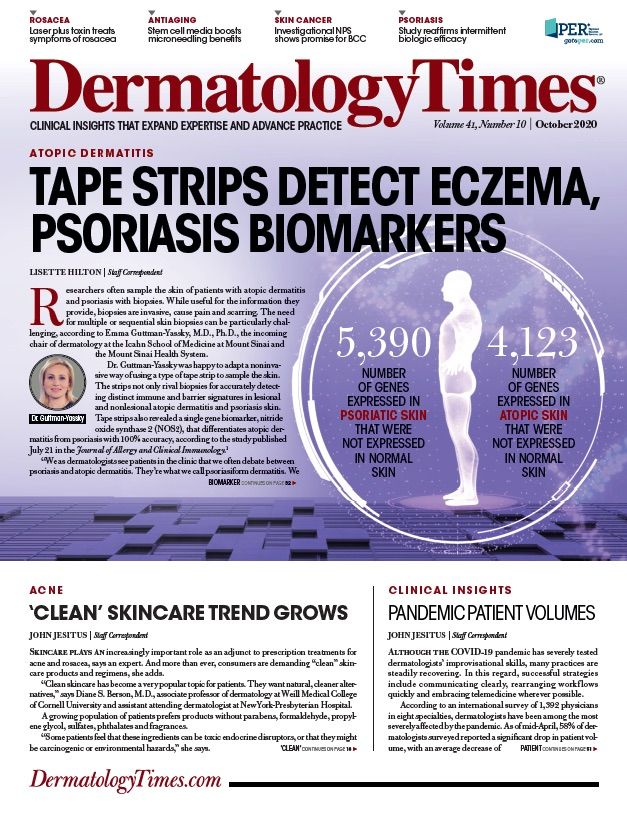- Case-Based Roundtable
- General Dermatology
- Eczema
- Chronic Hand Eczema
- Alopecia
- Aesthetics
- Vitiligo
- COVID-19
- Actinic Keratosis
- Precision Medicine and Biologics
- Rare Disease
- Wound Care
- Rosacea
- Psoriasis
- Psoriatic Arthritis
- Atopic Dermatitis
- Melasma
- NP and PA
- Skin Cancer
- Hidradenitis Suppurativa
- Drug Watch
- Pigmentary Disorders
- Acne
- Pediatric Dermatology
- Practice Management
- Prurigo Nodularis
- Buy-and-Bill
Publication
Article
Dermatology Times
Long-term data support tildrakizumab safety, user-friendliness
Author(s):
Phase 3 data show tildrakizumab’s (Ilumya, Sun Pharma) efficacy and safety last up to five years.
Recent phase 3 data show tildrakizumab’s (Ilumya, Sun Pharma) efficacy and safety last up to five years. Together with previously released data, says a study co-author, the new data present a clear picture of what patients with psoriasis and physicians can expect from the drug.
As a group, says Alan Mendelsohn, M.D., the 13 tildrakizumab abstracts presented at the American Academy of Dermatology VMX Virtual Meeting Experience 2020 reflect tildrakizumab’s durable effects. He is associate vice president of dermatology medical affairs with Sun Pharmaceuticals.
“The large majority of patients who are getting responses within four to six months are maintaining those responses for up to four years or more. They’re also maintaining a very striking safety profile.”
The reSURFACE 1 and 2 trials used a three-stage design with rerandomization for certain patient groups at weeks 12 and 28 before enrolling year-one responders into extension studies that tracked safety and efficacy through up to five years. In reSURFACE 1, the proportions of patients on tildrakizumab 100 mg who achieved Psoriasis Area and Severity Index (PASI) 75 at weeks 64 and 208 were 87% and 82%, respectively. The corresponding reSURFACE 2 figures for tildrakizumab 100 mg at weeks 52 and 196 were 92% and 85.7%.1,2
Dr. Mendelsohn says that the phase 3 data allow physicians to tell patients confidently that if they demonstrate a good response within four to six months of starting tildrakizumab, the effect likely will last four to five years for them; they need not worry about switching drugs or watching for increased risk of numerous adverse events.
The fact that the drug is physician-administered also helps providers monitor safety.
“If the patient has, let’s say potentially a small skin cancer or early signs of a cold, providers can delay the injection for a bit and still safely administer it,” he says.
One abstract showed that when PASI 75 responders go off drug, 43% to 46% maintain their effect for an entire year.3
“Particularly in the days of a pandemic such as we’re in, that’s extraordinarily important for patients to know,” he adds.
Combined with tildrakizumab’s FDA label, says Dr. Mendelsohn, the long-term phase 3 data provide reassurance, particularly versus labels of some other systemic psoriasis drugs. Tildrakizumab has no black-box warning or signals regarding congestive heart failure, malignancies or suicides.
“There is no recommendation about abnormal liver or hematological findings,” he adds. “So the absolute need from an FDA standpoint to monitor labs is markedly reduced.”
The durability of tildrakizumab responses and the fact that most patients see significant improvements over placebo four weeks after a single dose also will make physicians’ and patients’ lives easier, he adds.
“Our approach has been patient- and healthcare provider-centered. We are trying to come up with the most cost-effective management with the most important mechanism of action, which is interleukin (IL)-23. We’re also trying to gauge and manage expectations of the healthcare provider and patient in terms of what they can expect from our drug,” Dr. Mendelsohn says.
One abstract that traced correlations between short- and long-term responses showed that within four weeks of treatment, the average patient can expect a 42% to 45% PASI reduction.4. In phase 3, Dr. Mendelsohn says that patients began separating into bands of improvement (50-74%, 75- 89% and 90-100%) by week 12 and essentially remained there through four years. The average patient will be approximately 41% better within a month, 70% better within eight weeks and 90% to 95% better by week 28, he says.
“The flipside is, we feel very confident in being able to say to patients and healthcare providers, we can tell within 12 to 16 weeks after you start this drug if a patient will or won’t respond. We want to be as transparent and cost-effective as possible because in the end, that’s going to benefit the patients and healthcare providers,” he says.
DISCLOSURE:
Dr. Mendelsohn is associate vice president of dermatology medical affairs, Sun Pharmaceuticals.
REFERENCES:
1. Crowley J, Korman N, Spelman L, et al. Efficacy and safety of long-term tildrakizumab for plaque psoriasis: four-year results from reSURFACE 1. Abstract 15904. American Academy of Dermatology VMX. June 12, 2020.
2. Langley R, Gooderham M, Papp KA, et al. Efficacy and safety of long-term tildrakizumab for plaque psoriasis: four-year results from reSURFACE 2. Abstract 15910. American Academy of Dermatology VMX. June 12, 2020.
3. Cantrell W, Lee P, Mendelsohn AM, Parno J, Rozzo SJ, Liao W. Efficacy and safety of tildrakizumab 100 mg for plaque psoriasis in patients randomized to treatment continuation versus treatment withdrawal with retreatment upon relapse in reSURFACE 1. Abstract 12833. American Academy of Dermatology VMX. June 12, 2020.
4. Papp K, Yeung J, Shear N, et al. Early and maintained response levels in psoriasis patients treated with tildrakizumab. Abstract 17113. American Academy of Dermatology VMX. June 12, 2020.






